This blog reviews the process for applying for a marine medical certificate, including the physical examination for marine captain and drug testing for marine captain. The examination must be performed by a licensed physician, physician assistant, or nurse practitioner. The drug testing must be conducted in accordance with Coast Guard requirements. A medical certificate is a document that serves as proof that a mariner meets the required medical and physical standards as set by the Coast Guard.
The physical standards set by the Coast Guard include those shown below that must be validated during the physical examination for marine captain. These are copied from the Frequently Asked Questions: Medical Certificate page of the National Maritime Center:
- Have the physical capability to fulfill all the requirements of basic training as required.
- Demonstrate adequate hearing and speech to communicate effectively and detect any audible alarms.
- Have no medical condition, disorder or impairment that will prevent the effective and safe conduct of the seafarer’s routine and emergency duties.
- Are not suffering from any medical condition likely to be aggravated by service at sea or to render the seafarer unfit for service or to endanger the health and safety of other personnel on board.
- Are not taking medication that has side effects that will impair judgment, balance or any other requirements for effective and safe performance of routine and emergency duties on board.
- Mariners are required to carry a valid medical certificate, once issued, to sail under the authority of their MMC.
Breaking down these requirements a bit further, it becomes clear that the Coast Guard is focused on ensuring safe usage of boats, safe transport of passengers, and ensuring public safety. Physical capability refers to a mariner’s ability to move around and manipulate equipment. This is checked during the physical exam including testing strength, sensation, and coordination. Hearing and speech include communication with passengers and fellow crew members plus using audio devices like radios to ensure safe movement. The examiner tests hearing with the spoken voice at a distance. If there are concerns that the candidate is not able to hear adequately, a formal audiogram can be done for a more detailed assessment. If the candidate fails the audiogram, a hearing aid may be required to obtain the medical certificate with the restriction that hearing aids must be worn on the ship and extra batteries must be brought along.
Medical conditions include a wide array of possible health issues in any body system. The majority of the Merchant Mariner Medical Manual is dedicated to describing medical conditions, how to handle them, and what could potentially result in the need for waiver, restriction, or even denial. The reference to a medical condition that could be aggravated by service at sea reminds mariners that the body may react differently to being at sea versus being on land. Moreover, the lack of access to medical care and services at sea means the mariner must be stable medically and expect to remain so until back on land.
Medications are an important consideration for mariners, again because being at sea may have impacts on the body that change how effective medications are or modify their side effects. Furthermore, without access to providers or pharmacies, medication changes are not possible at sea. The examiner must be able to show that the candidate is not expected to need medicine changes and is stable enough on the medicine that symptoms are not expected. This is usually achieved by working with the candidate to obtain reports from the prescriber that establish the control of the condition and lack of side effects.
The drug testing involves a urine test that looks for five substances, Marijuana, Cocaine, Opiates, Phencyclidine, and Amphetamines. If you take amphetamines like Ritalin or Adderall for Attention Deficit Hyperactivity Disorder (ADHD), be sure to discuss this with your examiner before performing your urine test so the result is expected and can be explained. A specific process for collecting the urine sample that ensures proper chain of custody must be followed, and the sample must be sent to an appropriately certified laboratory. Some examiner offices, like Sea Medicine, can collect and send the urine test to a certified lab. Others may require candidates to find their own lab to have their sample collected and tested. The test result is required as part of the submission for the medical certificate.
If you have questions about the application process, we can help with you, including with your medical conditions and medications, so feel free to call us at (727) 648-2402 or email us at aweinberg@medavex.org. You can make an appointment by calling us or online at www.seadocfl.com. We also offer consultation appointments to discuss how to best approach your physical examination for marine captain and your drug testing for marine captain.





